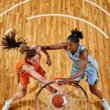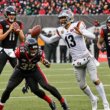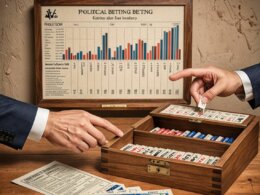- The legal landscape of college sports gambling has undergone a seismic shift since the Supreme Court's 2018 decision, opening up new revenue streams but also new challenges.
- The rise of sports betting has fundamentally altered fan engagement, with implications for media rights and college sports economics.
- Regulatory inconsistencies and the lack of federal oversight pose significant risks to the integrity of college sports.
- The relationship between gambling and fan identity is complex, raising questions about the nature of sports fandom in the era of legalized betting.
- Emerging concerns around player involvement and the impact on college athletics highlight the need for clear policies and robust regulatory frameworks.
Gambling on college sports isn't a novel concept, but its transformation from a shadowy underbelly activity to a mainstream revenue juggernaut has set the collegiate world on its heels. The evolution, or perhaps revolution, was sparked by a landmark Supreme Court ruling in May 2018. This pivotal moment in sports history struck down the Professional and Amateur Sports Protection Act of 1992, ushering in a new era where betting on college football and basketball isn't just tolerated; it's a flourishing part of the sports economy.
A New Era of Sports Betting
The ruling in favor of New Jersey's bid to legalize sports betting opened the floodgates for states across the nation to follow suit. Suddenly, what was once taboo or conducted in whispers is now a topic of mainstream conversation, complete with corporate sponsorships and legal bookies. But as much as this has normalized sports gambling, it's also cast a long shadow over the integrity of college sports, raising questions about everything from fan loyalty to the potential for manipulation.
The Ripple Effects on Fan Engagement
One of the more intriguing aspects of this shift is how it's changed the nature of sports fandom. Traditionally, college sports fans have been seen as purists, their allegiances tied to alma maters or regional pride. However, the infusion of gambling interests has introduced a new type of fan—one whose engagement might be more transactional than traditional. This shift not only affects the dynamics of fan bases but also has real implications for media rights and advertising revenues, which are the lifeblood of college sports economics.
Navigating Uncharted Waters
The regulatory response to this brave new world of sports betting has been a patchwork at best. With federal guidelines lacking, states have been left to their own devices, creating a fragmented landscape that poses significant challenges to maintaining the integrity of college sports. This lack of consistency not only complicates enforcement but also opens the door to potential abuses, from match-fixing to undue influence on young athletes.
The Complex Web of College Sports and Gambling
The intersection of gambling and college sports is fraught with complexities. On the one hand, the financial boon to leagues and institutions is undeniable. On the other, the potential for corruption and the erosion of traditional fan bases present existential threats. Moreover, the involvement of athletes in gambling activities—whether directly or indirectly through deals related to their name, image, and likeness—adds another layer of concern.
Looking Ahead
As the NCAA and other governing bodies scramble to adapt, the questions continue to mount. Can the spirit and integrity of college sports coexist with the commercial interests of the gambling industry? How can regulations be standardized in a way that protects athletes and preserves the essence of collegiate competition? And perhaps most importantly, what does the future hold for a system that finds itself at the crossroads of tradition and innovation?
These are not questions with easy answers, but they are ones that demand our attention. As we delve deeper into the implications of legalized sports betting on college athletics, it becomes clear that we are not just witnessing a change in the financial landscape but a fundamental shift in the culture of sports fandom itself. The path forward is uncertain, but one thing is clear: the stakes have never been higher.
Next in this series, we'll explore the evolving dynamics of college sports further, examining the impact of the transfer portal and the burgeoning influence of name, image, and likeness deals on the collegiate landscape. Stay tuned for a deep dive into "The End: The Name, Image, and Likeness Fiasco" and its implications for the future of college athletics.







